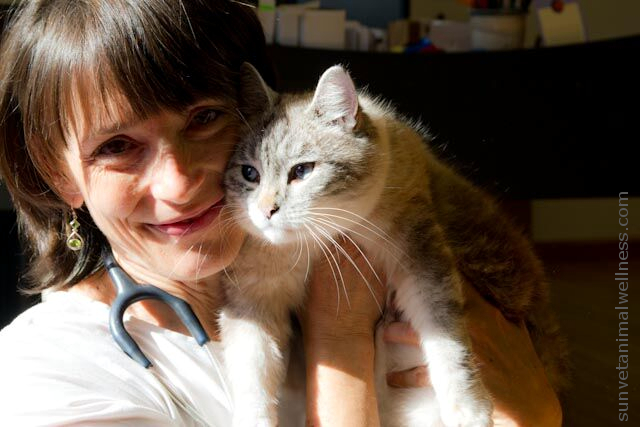Dr. Laurel Davis, integrative veterinarian, offers Stories from a Holistic Vet, the blog of a holistic vet and “animal interpreter”. With a clinic in downtown Asheville, NC. Dr. Laurel also offers animal health, lifestyle and vaccination advice for cats, dogs and their human friends across the country.
Have a question for Dr. Laurel? Send it in.
Want comprehensive or detailed dog or cat advice? Schedule an Ask Dr. Laurel™ phone or Skype consultation
Animals for Mental Health

May is Mental Health Month! It is a time when NAMI (National Alliance on Mental Illness) works to raise awareness about mental health issues. According to NAMI, 1 in 5 Americans will suffer from this. Here at Sunvet, we want to focus on how mental health issues relate to our animal friends. This week, we’re talking about the positive effects of animals for mental health.
I thank my lucky stars for my little part-siamese, cutest being in the world, Bee! Who’s the one that purrs me to sleep right next to my noggin? Who’s the one who pulls me away from the TV, computer or book to tell me to ‘get real’, get grounded, to go outside for a walk or play a game of cat and mouse? Who’s the one that listens to me rant and rave about a particularly taxing day? Bee, Beeder-Weeder, Prettiest One in the Wide World. She pulls me from my mental machinations into my conscious body. The caress of her silken fur, the trilling prritt (yes I know that’s not a word), she generates to grab my attention, the scent within the depths of her fluff and the rise-and-shine, tender tapping of her paw on my face are all designed to lure me into lightness of being, away from sadness, frustration, nervousness, fear, and anger.
These beautiful creatures that share our homes, our beds, our hearts, and our lives. They are there to support us in a myriad of ways. Somehow having an animal nearby can make stressful situations, negative feelings, and emotions less overwhelming. This is true not only for your average animal caretaker, but also for disabled, lonely, incarcerated, and institutionalized individuals. Animals for mental health or emotional support are primarily there to provide comfort to someone with anxiety, depression, post-traumatic stress disorder (PTSD) or another mental disability. These critters are given certain protections that regular companion animals are not, such as the right to live in housing that prohibits other pets, or to fly with their people.
Therapy Animals for Mental Health
Since the late 1970s, the Delta Society has been the most recognized name in the field of Animal Assisted Therapy. Dogs are the most frequently used therapy animals, but they also train cats, birds, rabbits, horses, donkeys, llamas, pigs and even snakes in their program.
According to research published in Advances in Mind-Body Medicine journal: “Animal-assisted therapy (AAT) has been shown to be effective in the treatment of many psychological disorders, including autism spectrum disorders, depression, anxiety and post-traumatic stress disorder (PTSD). AAT can be used as an adjunct to other forms of psychotherapy.”
As part of a mental-health treatment plan, AAT has been found to:
- Increase motivation
- Increase sense of comfort and safety
- Enhance self-esteem
- Increase pro-social behaviors
- Decrease behavioral problems
- Increase sense of comfort and safety
In another study, this time involving the use of horses in psychotherapy sessions for adolescents experiencing depression and/or anxiety, major improvements were noted. These included increases in confidence, self-esteem, assertiveness, and decreases in undesirable behaviors.
Next time you snuggle next to your furry or feathered pal, think of all the ways she supports you, buoys you up and releases you from the cacophony in your mind. Thank her deeply!
Shine on
I would like to thank Dr Karen Becker for some of the subject matter.
Dr. Laurel Davis is a holistic Asheville vet offering phone and Skype consultations for animal lovers everywhere. Call 828-254-2221 or order an Ask Dr. Laurel™ phone or Skype session or bring your dog or cat to her downtown Asheville, NC clinic. Read more patient stories.
Get to know Dr. Laurel by reading her blog.
Do you have a story about Dr. Laurel’s dog advice or how she helped your dog or cat? Please post your comment on our Facebook page or write a Google Review


